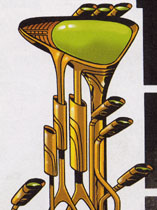These posts are either "jump pages" for my weblog or posts-in-process that will eventually appear there. For what it's worth, here's an archive of these random bits. The picture to the left is by a famous comic book artist.
View current page
...more recent posts
War on terrorism has its own dehumanizing name
New epithet being used by some soldiers to describe anyone from the Middle East or South Asia. The word has become evidence of the divide between cultures.
By JAY PRICE
Raleigh News & Observer
BAGHDAD, Iraq -- World War II had its "krauts," Vietnam had its "gooks," and now, the war on terrorism has its own dehumanizing name: "hajji."
That's what many U.S. troops across Iraq and in coalition bases in Kuwait now call anyone from the Middle East or South Asia. Soldiers who served in Afghanistan say it also is used there.
Among Muslims, the word is used mainly as a title of respect. It means "one who has made the hajj," the pilgrimage to Mecca.
But that's not how soldiers use it.
Some talk about "killing some hajjis" or "mowing down some hajjis." One soldier in Iraq inked "Hodgie Killer" onto his footlocker.
Iraqis, friend or foe, are called hajjis. Kuwaitis are called hajjis. Even people brought in by civilian contractors to work in mess halls or drive buses are hajjis - despite the fact that they might be from India, the Philippines or Pakistan, and might be Hindu or Christian.
The souvenir stands found on even the smallest U.S. bases in the Middle East and run by locals are called hajji shops. A cluster of small businesses inside a larger base is "Hajji Town."
The word has become the most obvious evidence of the deep gulf between the traditional cultures of the Middle East and Afghanistan and the young men and women of the U.S. military. Soldiers often have little knowledge of local culture beyond a 90-minute briefing they get before deployment.
"This is another reason that soldiers aren't good at winning the peace," said Samer Shehata of Georgetown University's Center for Contemporary Arab Studies. "This doesn't bode well for the reconstruction."
A spokesman for U.S. Central Command in Baghdad said that the term was troubling but that there had been no official order to stop its use.
"This is more of a commonsense thing," he said. "It's like using any other derogatory word for a racial or ethnic group. Some may use it in a joking way, but it's derogatory, and I'm sure people have tried to stop it."
(Centcom has a new policy, the soldier said, of not allowing press spokesmen to identify themselves in the media.)
In Iraq, there is little interaction between U.S. soldiers and the people they arrived to liberate.
Soldiers in the most dangerous parts of Iraq, such as the Sunni Triangle west and north of Baghdad, seldom have contact with Iraqis except to train guns on them from passing Humvees as they scan for weapons.
Their officers say the situation makes it easy to view all Iraqis as a faceless, dangerous mass, even though many civilians are friendly, so they try hard to humanize Iraqis to reduce the likelihood of wrongful shootings.
Every war spawns epithets.
In World War II, the Americans became "Amis " to the Germans. To Americans, Germans were "krauts."
"Hajji," Shehata said, sounds like racist terms that U.S. soldiers used in the 1991 Persian Gulf War, such as "towel-head."
The term brings back heavy memories for those who spent time in Vietnam during that war.
"That sounds familiar," said John Balaban, a North Carolina State University English professor and poet-in-residence who has written about Vietnam and the war. As a conscientious objector, Balaban did alternative service in Vietnam.
"There were several words - 'gook,' 'slope,' 'dink,' " he said. "Some of these were meaningless, but they were all working toward the same goal, of trivializing and depersonalizing the enemy.
"It makes it easier to kill these people and not feel bad about it."
Story distributed by Scripps Howard News Service.
Story produced by
Heather Leslie
